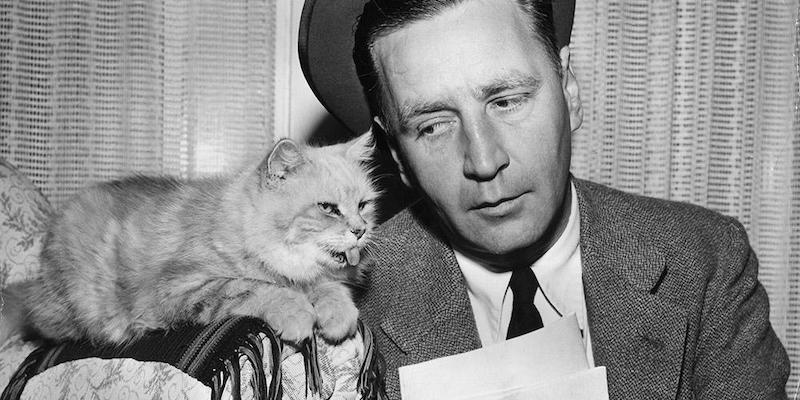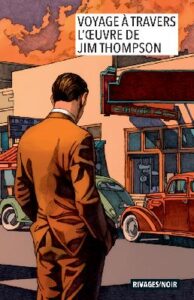I first read Jim Thompson when I was twelve years old. A burgeoning cinephile, I rented Stephen Frears’s adaptation of The Grifters from my local southern Brooklyn video store, and then—as was my usual course of action—I asked my mom to get me the novel next time we were at a bookshop. That was how I discovered a lot of my favorite writers as a kid—I didn’t like what I was assigned in school, but I was thrilled to discover writers like Thompson and Elmore Leonard via adaptations of their work. I tore through The Grifters, keeping the paperback open under textbooks in my classes and reading Thompson when I should’ve been listening to my teachers. That explains a lot about me.
The second Thompson book I read was The Getaway. I was probably thirteen by then. I watched the Sam Peckinpah/Walter Hill adaptation first (I’d already seen The Wild Bunch and was developing a great admiration for Peckinpah)—I loved it. My friend, the film writer Travis Woods, calls it Peckinpah’s “terse and vulgar pop cinema masterpiece.” I’m inclined to agree. But the film changes quite a bit about the book, which is much stranger, far more surreal and paranoid. I think that, as a kid, it confused me somewhat—it isn’t as straightforward as the film adaptation. The opening, with its roaming POVs, is shifty. The end is insane, Kafkaesque.
I could’ve easily chosen other Thompson books to write about here—I have so many favorites. I could start listing them, but you know the titles. His is a deep and profound catalogue. Very few writers have the impact on me that Thompson has had—stylistically, sure, but also in terms of his view of the world as bleak and corrupt and, yes, in terms of the weird choices he often makes. Thompson never hits preordained beats. He can write suspenseful scenes with the best of them, but he also freely abandons obvious roads he might travel down. I chose The Getaway because it’s indicative of his recklessness and inventiveness. It’s a novel fueled by digressions and desperation, the desperation of the characters—Doc and Carol and Rudy—and the situations they find themselves in, but it also feels like desperation itself. Bleeds it from around the edges. There’s something about the prose that is panicked, unrelenting.
I reread The Getaway in one sitting a few days ago and then rewatched both film adaptations. Going back to the book was a pure jolt of electricity. Reading Thompson is often like that for me—as soon as I put down the book, I need to write. I see and hear and feel the world differently. There’s some essential truth in Thompson’s work that stems from his paranoid vision. It makes more sense than ever in an America that feels on the verge of yet another reckoning. We’ve pushed things too far, betrayed too much. Reading Thompson helps dig to the bottom of that. He foresaw our end. His wild vision of the kingdom of El Rey, the sanctuary for criminals that Doc and Carol escape to at the conclusion of The Getaway, doesn’t feel far removed from our contemporary world—unmoored greed, souls sold.
Rereading the book and then rewatching the films was instructive in other ways. It was especially compelling to see that so many parts of the book were unadaptable, unapproachable even. Much of the book thrills, and that’s the stuff they latch onto in the films—the heist, the conman ripping off the bag of cash in the train station, Rudy trailing Doc and Carol, the tense showdown with Benyan—but then there’s that batshit crazy final act. Doc and Carol hiding in caves and piles of manure, the escape to El Rey, the dread that erupts there, the cannibals (!) that surround the town. Thompson’s dark humor and his viciousness are something that Hill, Peckinpah, and Roger Donaldson either let flit away or they repurpose it to their own ends. The Peckinpah film is great, and the Donaldson adaptation is solid (maybe even underrated), but neither feels like Thompson.
In his intro to the Black Lizard edition of The Getaway (my go-to copy), the legendary Barry Gifford says of Thompson: “Nobody else ever wrote books like these.” It was certainly true then, and it remains true. I think and hope that a new generation of readers and writers will discover Thompson—an American original. If I had to go on the lam tomorrow and could only bring a box of books with me, you can bet I’d grab a stack of Thompsons. The Getaway would be at the top.
***
A guide to the work of Jim Thompson was recently published by Éditions Rivages in France to coincide with their new reissues of Thompson’s books—it is being offered free of charge in bookstores. Thompson was the first author ever published by François Guerif when he created Rivages/noir. My essay—translated by the great Simon Baril, who has translated all of my novels—is on The Getaway. There are also essays by Jerry Stahl, Hervé Le Corre, Pascal Dessaint, Laurent Chalumeau, and Tonino Benacquista, and many others, as well as an interview with James Sallis. It’s an honor to be in this book, talking about one of my favorite writers. Thanks to François and Jeanne Guyon for asking me to contribute.


















